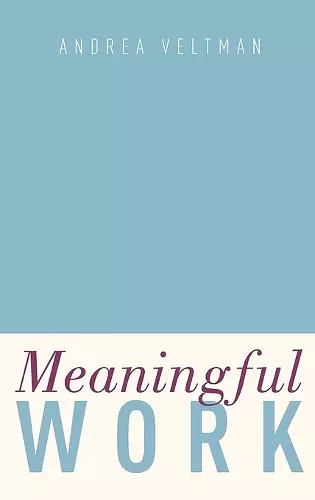Meaningful Work
Format:Hardback
Publisher:Oxford University Press Inc
Published:17th Nov '16
Currently unavailable, and unfortunately no date known when it will be back

This book examines the importance of work in human well-being, addressing several related philosophical questions about work and arguing on the whole that meaningful work is central in human flourishing. Work impacts flourishing not only in developing and exercising human capabilities but also in instilling and reflecting virtues such as honor, pride, dignity, self-discipline and self-respect. Work also attaches to a sense of purposefulness and personal identity, and meaningful work can promote both personal autonomy and a sense of personal satisfaction that issues from making oneself useful. Further still, work bears a formative influence on character and intelligence and provides a primary avenue for exercising complex skills and garnering esteem and recognition from others. The author defends a pluralistic account of meaningful work, arguing that work can be meaningful in virtue of developing capabilities, supporting virtues, providing a purpose, or integrating elements of a worker's life. In light of the impact of meaningful work on living well, the author argues that well-ordered societies provide opportunities for meaningful work, that individuals would be well advised to pursue these opportunities, and that the philosophical view of value pluralism, which casts work as having no special significance in an individual's life, is false. The book also addresses oppressive work that undermines human flourishing, examining potential solutions to mitigate the impact of bad work on those who perform it. Finally, a guiding argument of the book is that promoting meaningful work is a matter of ethics, more so than a matter of politics. Prioritizing people over profit, treating workers with respect, respecting the intelligence of working people, and creating opportunities for people to contribute developed skills are basic ethical principles for employing organizations and for communities at large.
Andrea Veltman presents a welcome and engaging argument for the importance of meaningful work in human lives. * Ruth Yeoman, Australasian Journal of Philosophy *
In this elegantly written book, Veltman argues that meaningful work is an essential human good and, as such, is necessary for a flourishing life. Her arguments about the centrality of meaningful work are compelling. * Adrian Walsh, University of New England, Australia, Ethics *
Meaningful Work carves out a new direction in liberal political theory and makes for essential reading in a business ethics seminar for undergraduates as well as graduate students. It develops a cogent defense of a eudaimonic capabilities approach by analyzing diverse workplaces and providing a novel feminist contribution to care ethics. * Mechthild Nagel, Hypatia: A Journal of Feminist Philosophy *
Looking to contemporary figures like Susan Wolf and ancient ones like Aristotle, Veltman constructs a multidimensional and pluralistic account of meaningful work. * Russell Muirhead, Notre Dame Philosophical Reviews *
Meaningful Work contributes to a growing literature on work in philosophy and political theory...Written in unpretentious style, the book or a chapter will be an excellent addition to an undergraduate or a graduate syllabus...Summing up: Highly recommended. * H. McManus, CHOICE *
Andrea Veltman's Meaningful Work raises the bar for all future contributions to this topic: she marshals overwhelming evidence that work is central to human flourishing and demolishes the popular view that our need for work that is meaningful is just one preference among others. * Paul Gomberg, University of California, Davis *
What is the normative status of work? In this elegantly written, powerfully argued book, Andrea Veltman rejects the answer of mainstream political theory that meaningful work is merely one optional value among others. The right way of thinking about meaningful work, Veltman argues, is as a good that is central to human flourishing. She mounts a compelling case for this conception and draws out its far reaching consequences for questions of autonomy and justice. The result is a major contribution to political philosophy that should be essential reading for political theorists, applied ethicists, and indeed anyone concerned by the quality of work and possibilities for improving it. * Nicholas Smith, Macquarie University *
ISBN: 9780190618179
Dimensions: 155mm x 241mm x 28mm
Weight: 771g
248 pages